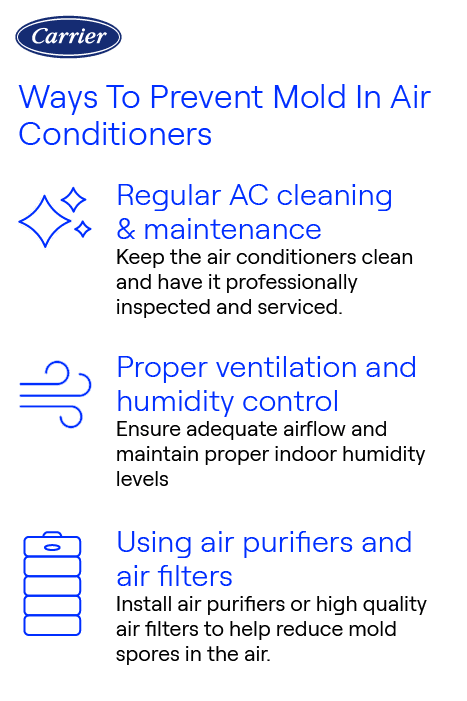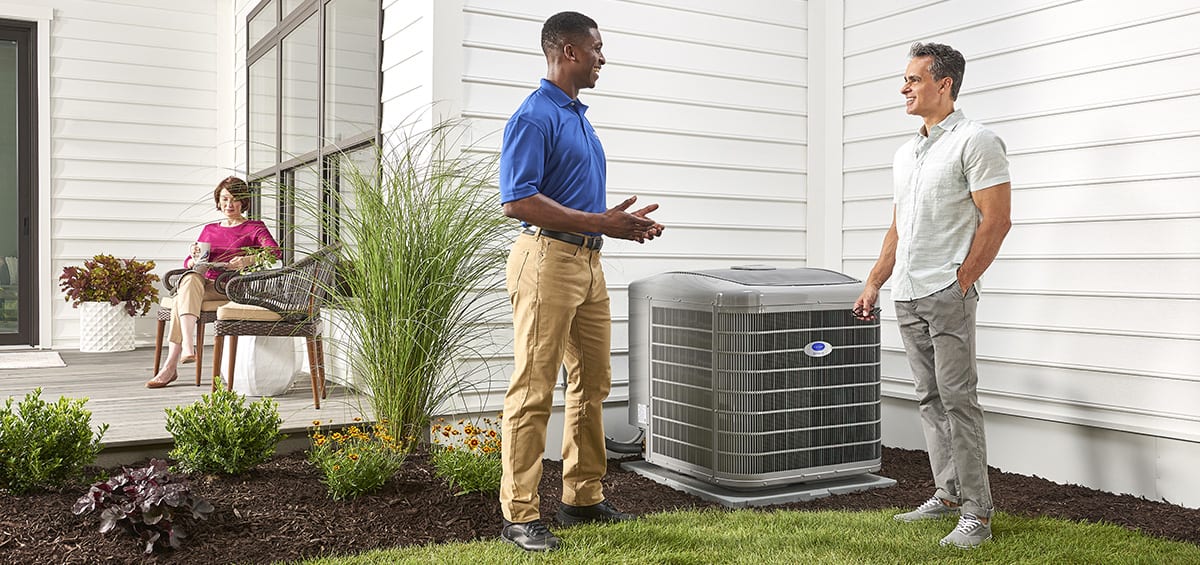Mold In Air Conditioner? Prevent and Treat Mold in AC Unit
How to Prevent and Remove Mold in AC System
Are you worried about mold in your air conditioner? Mold is a common issue that requires prompt attention to maintain a healthy indoor environment. In this article, we will guide you through understanding mold growth in air conditioners, preventing mold formation, removing existing mold, and maintaining a mold-free air conditioner. We will also address frequently asked questions about mold in air conditioners. At Carrier, we know the importance of clean air and offer solutions to help you achieve a mold-free environment. Let's explore the details to keep your air conditioner mold-free.

Understanding Air Conditioning and Mold
Mold growth in air conditioners is a common problem for many homeowners. Understanding how mold forms, its causes, and the dangers it poses can help you prevent and address this issue effectively.
Mold forms in air conditioners when moisture is present and conditions are favorable for its growth. The cooling coils in an air conditioner are often damp and dark, creating an ideal environment for mold. When warm air passes over these coils, moisture condenses, providing a breeding ground for mold.
Common causes of mold growth in air conditioners include poor maintenance, such as neglecting regular cleaning. This can lead to a buildup of dust, debris, and moisture in the system, creating ideal conditions for mold. High humidity levels in the environment can also contribute to mold growth.
Mold in your air conditioner can pose various dangers to your health and indoor air quality. Mold spores released into the air can cause respiratory issues, allergies, and worsen existing respiratory conditions. Prolonged exposure to mold can lead to more severe health problems.
Jennifer Fletcher, owner of Modern Air Solutions in Gurnee, IL urges homeowners to take the matter seriously if mold is found in their air conditioner.
“Mold if found is an immediate call to the professional,” Fletcher said. “Mold is serious and can cause some damage to your lungs. There are several things that need to be checked.”
To prevent mold growth in your air conditioner, maintain proper AC maintenance practices and regularly schedule an AC tune-up with your local Carrier dealer. Monitoring and controlling humidity levels in your home can also help prevent mold growth.
Preventing Mold in Air Conditioner

Mold growth in an air conditioner can lead to health issues and affect indoor air quality. To ensure a mold-free environment, take preventative measures. Here are some tips to help you prevent mold in your air conditioner:
- Regular cleaning and maintenance: Regularly clean and maintain your air conditioner to prevent mold growth. This includes cleaning or replacing the air filters, removing any debris or dust from the unit, and ensuring proper drainage. A clean and well-maintained air conditioner is less likely to harbor mold. Learn more about how to change air conditioner filters .
- Proper ventilation and humidity control: Proper ventilation is crucial in preventing mold growth. Ensure that your air conditioner is properly ventilated to allow for adequate airflow. Additionally, control humidity levels in your home, as high humidity can promote mold growth. Use a dehumidifier if necessary to maintain optimal humidity levels.
- Using air purifiers and filters: Consider using air purifiers and filters to improve indoor air quality and reduce the risk of mold growth. High-quality air purifiers can help remove mold spores from the air, while filters can trap dust, pollen, and other allergens. Be sure to choose filters that are compatible with your air conditioner and replace them regularly.
By following these preventive measures, you can minimize the risk of mold growth in your air conditioner and maintain a healthy indoor environment. A regularly scheduled AC tune up is another great way to ensure your air conditioner is running effectively throughout the year.
Removing Mold In AC Unit
Is your air conditioner emitting a musty smell? Are there dark spots, fuzzy patches, or discoloration on vents, coils, or drip pans? These could be signs of mold growth in your air conditioner. Mold not only affects the air quality in your home but can also lead to health issues if left untreated.
To identify signs of mold in your air conditioner, look for visible mold growth, musty odors, or excess moisture. Check the air filters, evaporator coils, and condensate drain pan for any signs of mold. If you notice any discoloration, black spots, or a slimy texture, it's likely that mold has started to grow.
When it comes to eliminating mold issues with your split system air conditioner, seek the assistance of a professional Carrier dealer. They have the expertise and proper equipment to remove mold effectively.
Maintaining a Mold-Free Air Conditioner
It is important to schedule regular AC maintenance with your local Carrier dealer. They can identify any potential issues and address them before they become major problems and AC repair is required. They can also clean the unit thoroughly, removing any dirt or debris that may contribute to mold growth.
Additionally, you can take some air conditioner maintenance steps on your own to prevent mold from developing. One important aspect is dealing with condensation and moisture. Make sure that your AC unit is properly draining excess water and that there are no leaks or blockages in the AC drain line. Excess moisture can create the perfect environment for mold to thrive.
Furthermore, watch out for signs that indicate mold growth in your air conditioner. These signs may include a musty odor when the unit is running or visible mold or mildew on the unit or vents. If you notice any of these signs, it is crucial to take immediate action to prevent further mold growth and protect your indoor air quality.

FAQs about Mold in Air Conditioners
Contact Carrier for Mold In AC System Solutions
Choosing the right air conditioner for your needs is essential in preventing mold growth. Our extensive range of air conditioner products includes advanced features that prioritize air quality and minimize the risk of mold formation. With options such as high-efficiency filters, dehumidification capabilities, and smart technology, our air conditioners are designed to create a clean and healthy environment in your home.
At Carrier, we understand the importance of maintaining a healthy and comfortable indoor environment. If you are concerned about mold in your air conditioner, your local Carrier dealer is well-equipped to handle any mold-related concerns you may have, whether it's identifying the presence of mold or offering advice on preventive measures.
Learn More About AC Units
- Help with Air Conditioner Service
- Find Out How Do Air Conditioners Work
- Troubleshoot an Air Conditioner tips
- Factors and variables - "How Long Do Air Conditioners Last?"
- Is your Air Conditioner Not Cooling?
- Discover the benefits of UV lights for air conditioners

